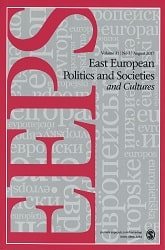Postcolonialism: A Valid Paradigm for the Former Sovietized States and Yugoslavia?
Postcolonialism: A Valid Paradigm for the Former Sovietized States and Yugoslavia?
Author(s): Henry Frank Carey, Rafal RaciborskiSubject(s): Human Rights and Humanitarian Law, Political history, Government/Political systems, Social development, Post-Communist Transformation, Sociology of Politics
Published by: SAGE Publications Ltd
Keywords: postcolonialism; democratization; post-communism; human rights;
Summary/Abstract: This article argues that the structuralist effects on the large variation in the diverse human rights and democratization records of post-communist states can be best explained through the optic of postcolonialism. This approach would not override recent effects of strategic actors, though the type of postcolonialism in a post-communist state greatly constrains their actions. Among the postcolonial constraints are unsolved colonial-era problems, the type of colonial mentorship and institutions, the process of decolonization and the immediate regime path created in extricating from communism, the ongoing metropolitan-postcolonial elite relationships, and their links to mass politics. Five postcolonial regions emerge that reflect variable colonial and postcolonial experiences. The Soviet colonial experience had the most negative, direct, and ongoing effects on the former Soviet republics. Postcolonial effects on East Central Europe and the Balkans are less than the former USSR because of overlapping colonial heritages with Western empires and the shorter Soviet influence.
Journal: East European Politics and Societies
- Issue Year: 18/2004
- Issue No: 02
- Page Range: 191-235
- Page Count: 45
- Language: English
- Content File-PDF

